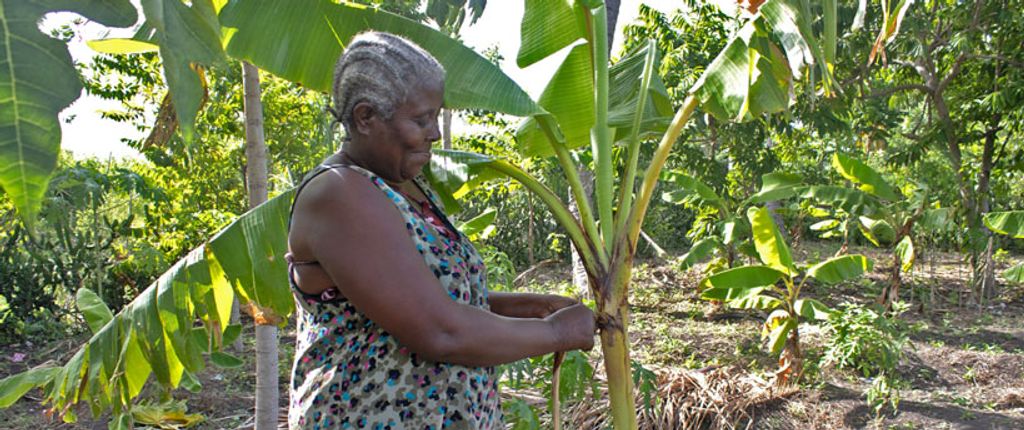
Economic development and empowerment of women
Despite rising food prices and high inflation, around 80% of Haitians live on less than two US dollars a day. The agricultural sector is crucial to Haiti's economy, employing half of the workforce, with around 70% of those workers being women. Agriculture serves as a vital source of livelihood and is key to ensuring food security. Women play a pivotal role in providing for their families, yet they often face societal disadvantages.
In partnership with our partner organization AHAAMES, we support the economic development and empowerment of women in particularly vulnerable communities in the Nippes and West departments. This targeted support aims to enhance women's economic participation, promote food security, and improve their negotiating power within society.
Haiti's economic and social challenges have been longstanding, with women facing particular struggles in earning a living and supporting their families. Half of the workforce is employed in agriculture, a critical source of livelihood for many. However, limited infrastructure in rural areas hampers agricultural productivity. Severe droughts, poor access to water, soil degradation, and rising costs of inputs compound these difficulties. Women play a crucial role in agriculture and household management but encounter numerous barriers, including restricted access to land, credit, and markets. Furthermore, cultural norms and traditional gender roles limit women's involvement in decision-making and commercial activities.
In the fisheries sector, women's roles are often confined to processing or selling fish, where they have limited bargaining power and rely heavily on male fishermen for economic opportunities. Limited access to financing for proper equipment to preserve fish forces them to sell quickly, locally, and at lower prices. Socio-economic tensions and entrenched gender dynamics in the male-dominated fishing industry often perpetuate the cycle of economic marginalization for women.
- Developing local expertise in sustainable agriculture and fisheries.
- Empowering women and enhancing their independence.
- Advocating for and advancing gender equality.
- Supporting income-generating initiatives and improving market access for women.
- Enhancing economic opportunities for the target group and increasing women's participation in local value chains.
- Providing greater access to savings and loans with low interest rates, particularly for women.
- Offering training and facilitating networking opportunities for women.
- Optimizing water usage and management.
- Strengthening food security and promoting self-sufficiency.
Together with the affected communities and the organization AHAAMES, we carry out activities with a special focus on strengthening the role of women. Some of these activities are listed below:
- Distributing and improving access to seeds in agricultural communities;
- Promotion and training in the keeping of livestock (which supplements the diet with important proteins and produces meat that can be sold within the community);
- Training of smallholder farmers in planting gardens, creating orchards, managing water and the sustainable cultivation of different crops by agricultural experts in farmer field schools;
- Establishment of village savings and credit associations with gender parity or majority female participation for improved access to credit and markets;
- Conducting workshops for women's associations from fishing communities on awareness, capacity building, marketing, business management and the formation of women's associations;
- Equipping women with equipment and materials, such as solar-powered cool boxes;
- Conducting awareness-raising workshops on diversified nutrition, sustainable use of resources and gender equality.
Country info
Captial: Port-au-Prince
Area: 27,750 km²
Population: approx. 11.5 million
Project data
Donors: German Federal Ministry for Economic Cooperation and Development (BMZ), German Federal Foreign Office (AA), Taiwan Technical Mission (TTM)
Partner: AHAAMES








